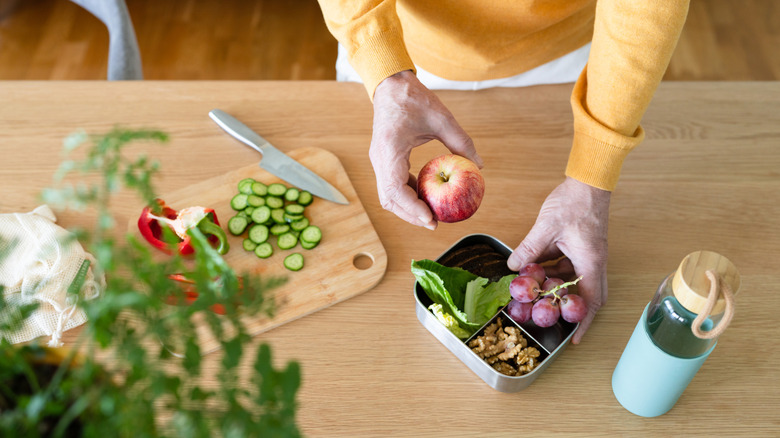Which Fruit Is The Highest In Carbs?
Although carbs get a "thumbs down" vote from people who strictly adhere to high-protein diets like the carnivore diet, they aren't inherently terrible for you or your health. In fact, carbs provide you with energy and can help you stay full for longer. (And for the record, the carnivore diet could cause scurvy.)
That said, some carbs are better for you than others. For instance, white sugar is a carb, but sugar doesn't bring any other nutrients to your table, thereby making it an "empty" carb. After all, when you dissolve a teaspoon or two into your coffee, you're not getting any other nutrients along for the ride.
On the other hand, some sources of carbs fall into the "functional foods" category. They earn this fancy title because they're nutritionally diverse. Take fruit, for instance. A piece of fruit may contain natural sugars (and some fruits admittedly contain a lot of sugar), but fruit also provides you with fiber, vitamins, minerals, and beneficial compounds. Therefore, when you want to fuel up on carbs, eating fruit instead of an "empty carb" food could ensure that you get more than just an energy boost. With this in mind, you may want to give priority to high-carb fruits (the kind of fruits not allowed on the keto diet) when aiming to reach your daily carb goal, starting with bananas.
Bananas are a tropical fruit that top the carb list
A single banana packs in 26.4 grams of carbs (1.96 grams from fiber). But that's not all: Your banana will also contain 5.75 milligrams of calcium, 32.2 milligrams of magnesium, and 375 milligrams of potassium.
Indeed, when you eat bananas as a carb source, you may find that you're protecting many parts of your body against future damage, including your heart. For example, a 2024 study in Frontiers in Nutrition explored the health impact of eating fruit regularly for a decade in people with high blood pressure. Of all the fruits studied, bananas appeared to reduce the chance of death. The same cardioprotective properties were also identified in apples, another high-carb fruit pick.
Tree and vine fruits add more than just carbs
Apples share many of the nutrients you'll find in bananas. If you eat a medium apple with the skin intact, you'll consume 25.1 grams of carbs (2.0 grams is fiber), 10.9 milligrams of calcium, and a decent dose of vitamins A and C. The combination of advantageous nutritional elements in apples doesn't just support your cardiovascular system, though: It may help your brain function more clearly as you age. According to a 2024 study in Scientific Reports, older mice who were given polysaccharide extracts from apples showed cognitive improvements, possibly due to the fruit's antioxidant properties. (Cool fact: Portobello mushrooms have plenty of health-promoting polysaccharides as well.)
Grapes are yet another naturally sweet high-carb option from the produce aisle. Every time you eat a cup, you'll score 27.3 grams of carbs (1.36 grams of fiber), 15.1 milligrams of calcium, and antioxidants. Like bananas and apples, grapes could be just what your body needs, according to researcher Dr. John Pezzuto in an interview for the American Heart Association.
"The scope of the potential health benefits is so broad – cardiovascular, brain, bladder, colon – the list just goes on," said Dr. Pezzuto. He added that one of grapes' strongest advantages is their 1,600+ phytochemicals, which support the human biome (including the skin) and may lower the risk factors for some diseases.


